Waking up tired or having trouble staying asleep? You could be interrupting your sleep cycles and not getting enough deep sleep to heal and recharge.
You’re either awake or asleep, right? Actually, it’s a bit more complicated than that. Sleep is a complex process with a repeating pattern of different stages of sleep that lasts about 90-120 minutes. Throughout the night, we go through multiple sleep cycles, and each cycle is like a complete journey through these different sleep stages.
Having multiple sleep cycles during the night is essential for achieving restorative and restful sleep. Completing several cycles each night allows your body and mind to recover and recharge.
But what happens when you don’t get enough sleep, or your sleep cycles are out of sync?
What is a Sleep Cycle?
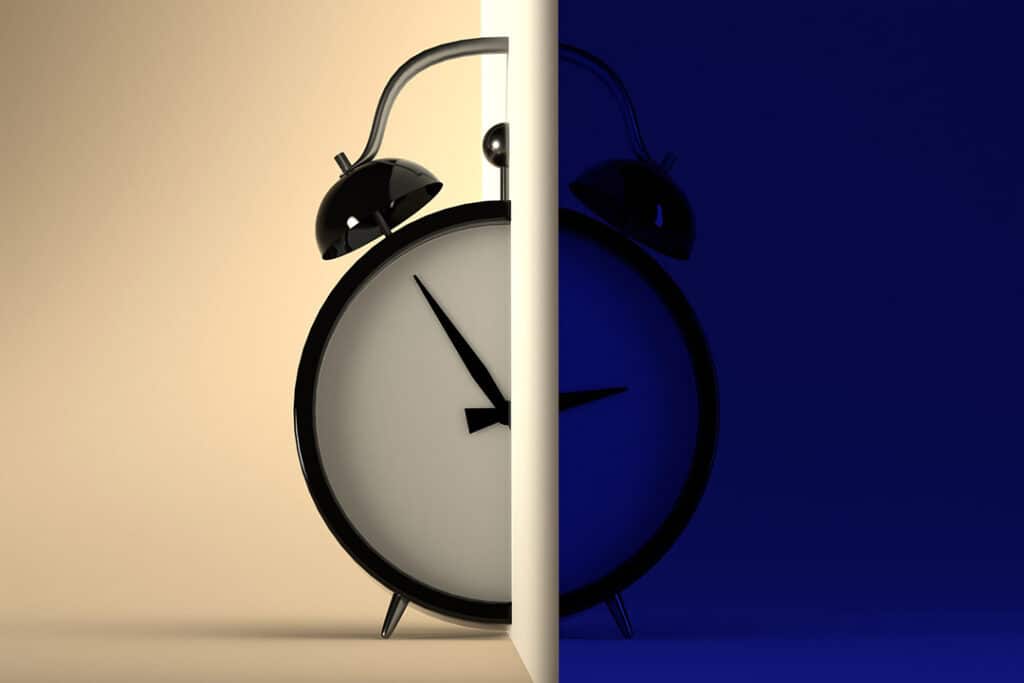
The sleep cycle consists of two main types of sleep: rapid eye movement (REM) sleep and non-rapid eye movement (NREM) sleep. While REM is a stage on its own, NREM sleep has a few different stages. Let’s take a closer look at each sleep stage and what’s happening in your body behind closed eyes.
The Key Stages of Sleep

Light Sleep (NREM Stage 1)
Best for a quick energy boost
Length: 20 minutes and approximately 5% of sleep time
- This stage is a transition from being awake to falling asleep.
- It’s a light sleep, and you can easily wake up from it.
- Your eye movements are slow, and your muscles start to relax.
Moderate Sleep (NREM Stage 2)
Best for general rest
Length: 25 minutes during your first sleep cycle, then increases with each new cycle. Approximately 45% of sleep time.
- A deeper sleep than before.
- Your brain waves become more rhythmic, and you may experience occasional bursts of rapid brain waves.
- Your body temperature drops and your heart rate slows.
- NREM Stage 2 is the most common stage during your sleep cycle.
Deep Sleep (NREM Stage 3)
Best for healing, growth, and repair
Length: 45-90 minutes during your first sleep cycle, then increases with each new cycle. Approximately 25% of sleep time.
- NREM Stage 3 is also known as slow-wave sleep or deep sleep.
- During this stage, your brain produces slow, high-amplitude delta waves.
- Your blood pressure and breathing rate reach their lowest points, and your body experiences significant muscle relaxation and repair.
- This stage is essential for physical restoration, growth, and overall well-being.
- It is difficult to wake up during deep sleep.
- If you interrupt a deep sleep cycle, you’ll feel groggy for 30-60 minutes.
Rapid Eye Movement Sleep (REM Sleep)
Best for memory, emotional processing, and healthy brain development
Length: 10 minutes during your first sleep cycle, then increases with each new cycle. Approximately 25% of sleep time.
- REM sleep is a unique stage characterized by rapid and random eye movements.
- Your brain becomes more active during REM sleep, and this is when most dreaming occurs.
- To prevent you from acting out your dreams, your muscles are mostly paralyzed during this stage.
- REM sleep is crucial for memory consolidation, processing emotions, and supporting cognitive functions.
What’s the Most Important Sleep Stage?
Each stage of sleep is needed for various aspects of physical and mental restoration, memory consolidation, and overall well-being.
But, deep sleep is considered the most important stage of sleep for healing. It is only during deep sleep that our bodies can take on the most crucial repair work.
During deep sleep, our tissues, muscles, and bones get repaired and rejuvenated. We also release growth hormones during deep sleep that help us grow, repair cells, and boost the immune system.
Deep sleep is also important for our minds. During deep sleep, we are able to store and solidify new knowledge, skills, and memories.
How Much Deep Sleep Do We Really Need?
It’s clear that deep sleep is important for our health. But how much do we really need to feel the benefits?
The amount of deep sleep we need depends mostly on age. The younger you are, the more time in deep sleep your body needs to heal, grow, and rejuvenate. Here are a few general guidelines for the best amount of deep sleep based on your age:
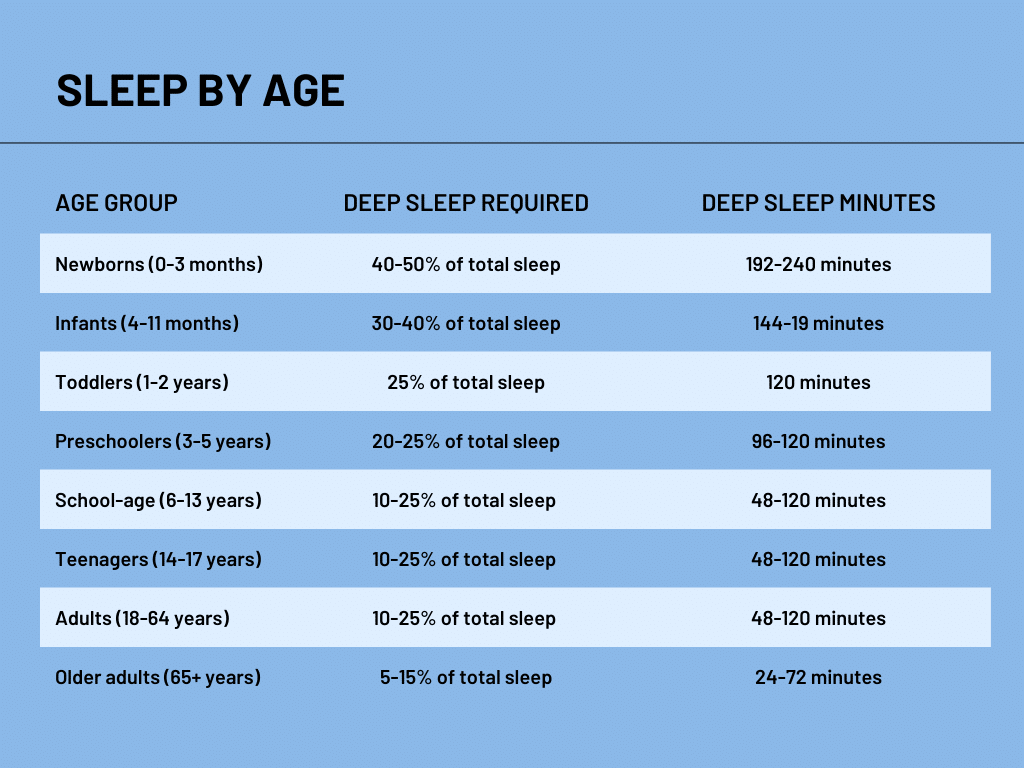
Why You’re Waking Up Tired
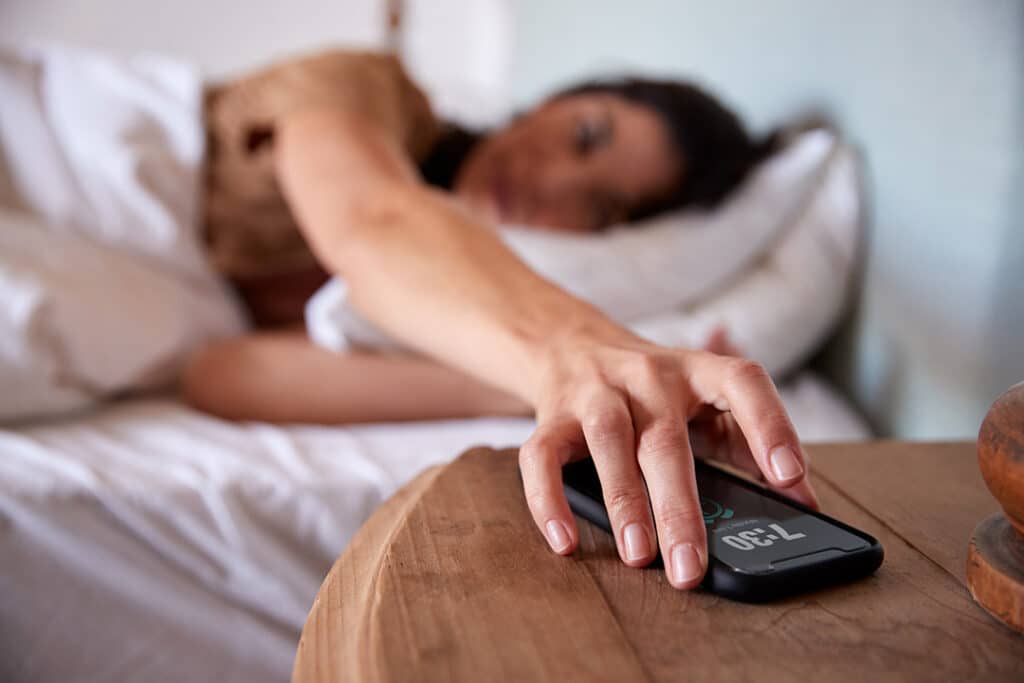
Understanding sleep cycles helps us appreciate the importance of getting enough quality sleep each night to feel rested, alert, and ready to face the day ahead. But what if you’re still waking up tired?
There are a few sneaky culprits that can affect your sleep cycle and how alert you feel in the morning:
>> Your sleep cycles are interrupted.
A fragmented sleep cycle is a common reason people feel tired, even though they spend 8 or more hours in bed. This usually happens due to issues such as noisy environments (or a snoring partner), discomfort or pain, night sweats, or an underlying sleep disorder like sleep apnea.
>> You have an irregular sleep schedule.
If you are someone who goes to bed or wakes up at different times, you could be sabotaging your sleep cycles. And yes, that includes sleeping in on the weekends. Irregular sleep schedules can throw off your internal body clock and disrupt the natural timing of your sleep cycles. Try to stick to a similar bedtime and wake time every day to keep your cycles in sync.
>> Caffeine or alcohol is disrupting your sleep cycles.
Consuming caffeine or other stimulants too close to bedtime can interfere with falling asleep and disrupt the sleep cycle. And while alcohol may initially make you feel drowsy, it can negatively impact the later stages of sleep, leading to disruptions and reduced sleep quality.
>> You’re snoozing your morning alarm.
No matter how much you want to believe it, those extra ten minutes in bed won’t make you feel more awake. When you fall back asleep after hitting the snooze button, you enter a new sleep cycle. Once that second alarm goes off, you could wake up in the middle of deep sleep. This leaves you feeling groggy and disoriented. It’s best to set your alarm for a time when you can complete a full sleep cycle and wake up during a lighter stage of sleep for a more refreshed morning.
Signs You’re Not Getting Enough Sleep
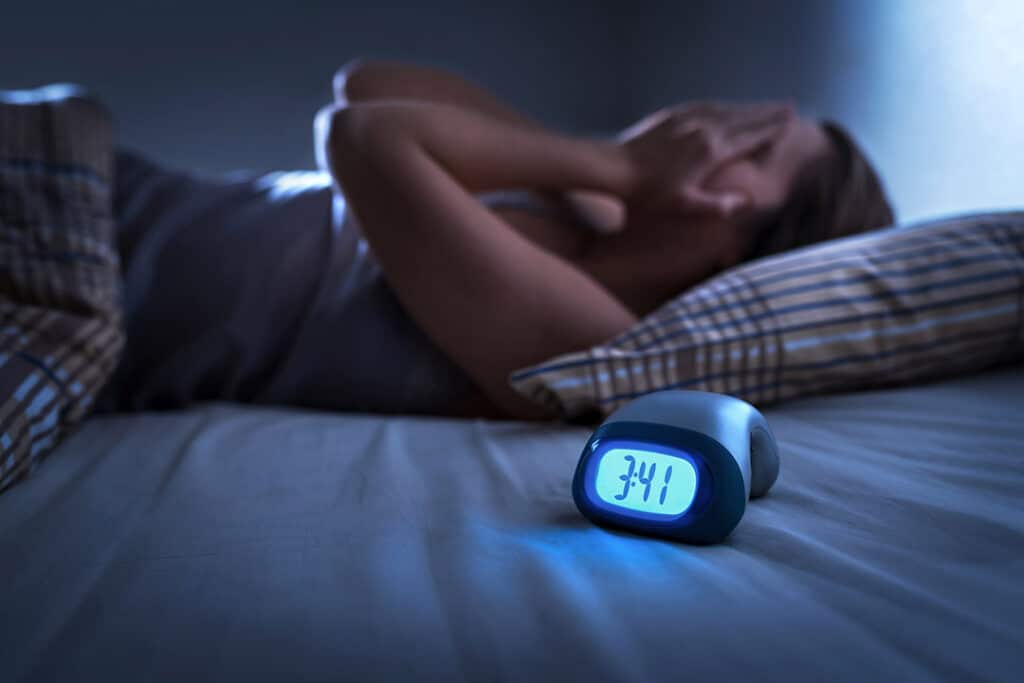
Along with the issues above, simply not getting enough sleep can play a huge role in how you feel during your waking hours. Most people should aim for 7-9 hours of uninterrupted sleep each night. If you’re not in bed for that long, you’re likely not getting enough sleep to go through enough full sleep cycles to feel rejuvenated.
Here are the tell-tale signs your body’s calling out for more sleep:
- Feeling constantly tired or fatigued during the day
- Difficulty concentrating or staying focused on tasks
- Increased irritability or mood swings
- Memory problems and forgetfulness
- Reduced motivation and productivity
- Struggling to stay awake or feeling drowsy while driving
- Headaches or frequent migraines
- Increased appetite and cravings, especially for sugary or high-calorie foods
- Weakened immune system and frequent illnesses
- Dark circles under the eyes or pale skin
- Impaired coordination and balance
- Increased stress levels and feelings of anxiety or depression
How to Hack Your Sleep Cycles to Get More Deep Sleep
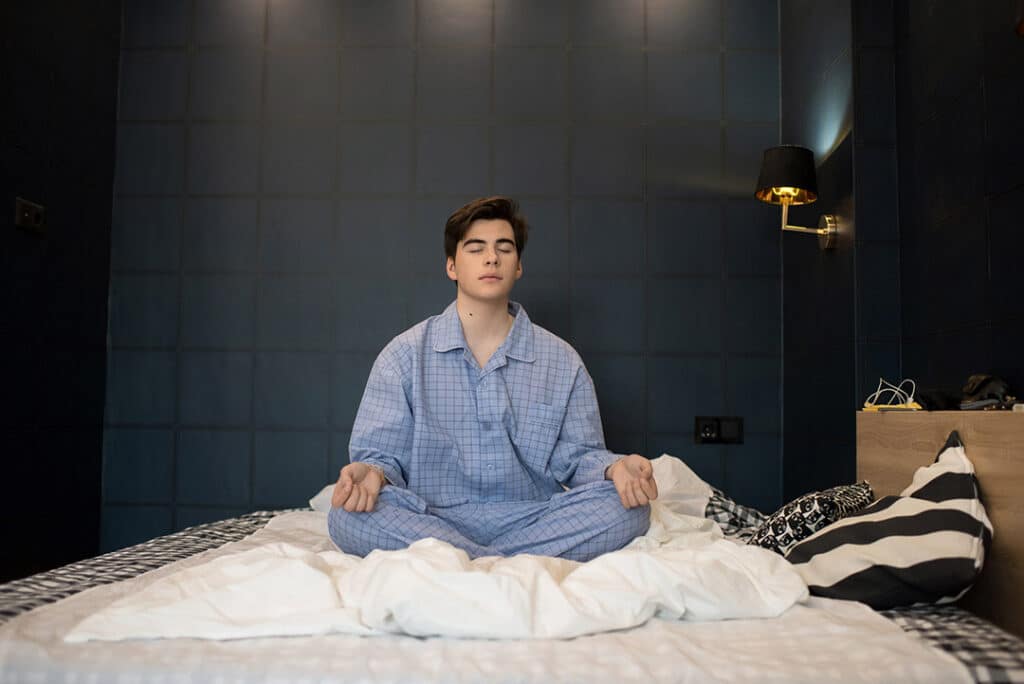
As you can see, sleep is essential to our health. Along with making simple habit changes for better rest, try these tips to make the most of every sleep cycle.
1) Stick to a routine.
A sleep routine makes it easy for your brain and body to fall into a naturally healthy sleep cycle. Go to bed and wake up at the same time every day, even on weekends. This helps regulate your body’s internal clock, promoting better alignment with natural sleep cycles and increasing the chances of getting more deep sleep.
2) Use the 90-minute rule.
Sleep cycles tend to be about 90 minutes long. If you wake up at the end of a cycle, you’ll feel more refreshed and closer to full alertness, leading to more productive days. You can reverse-engineer your optimal bedtime by subtracting 90-minute intervals from when you need to wake up. For example, if you need to wake up at 6 am, work backward in 90-minute increments to determine your ideal bedtime (which, in this case, would be about 10:30 pm).
3) Use a sleep tracker.
Sleep trackers can’t promise better sleep, but they can be a helpful tool to understand your unique sleep patterns and how to improve them. These devices and apps provide valuable insights into sleep duration, stages, and wake-ups, all of which help you establish more consistent sleep routines and create a better sleep environment.
There are many different sleep trackers on the market today, some better than others. We recommend looking for a tracker that is accurate, science-backed, comfortable to use or wear, and protects your health data. According to the Sleep Foundation, some reputable trackers are WHOOP 4.0, and Rise Science Sleep Tracker.
4) Exercise during the day.
Exercising during the day (rather than in the evening or night) is best for your sleep cycles. Daytime exercise allows your body temperature to cool down before bedtime, making it easier to fall asleep. It aligns your circadian rhythm with daytime activity, reduces sleep disruptions, and leads to improved sleep quality. Additionally, you’ll enjoy the benefits of exercising during the day, like a better mood, reduced stress, and faster metabolism!
5) Meditate at night.
How you spend those last few minutes before falling asleep can have a huge impact on the quality of your sleep cycles. Meditation is a great way to set yourself up for sleep success. When you practice meditation before bedtime, it helps create a calm and peaceful mental space, reducing stress and anxiety that might interfere with your sleep. You’ll feel more relaxed, and it’ll be easier for your body and mind to wind down, resulting in better sleep quality and the potential for more consistent sleep patterns over time.
The Best Supplements for Better Sleep

Supplements are part of a comprehensive sleep wellness plan. While everyone’s nutrition and supplement needs vary, our AlignLife chiropractors recommend these three supplements for most people who want to improve their sleep:
- Reduce Stress to Sleep Better: Aceva Relax & Calm
One of the most common reasons we struggle to get a good night’s sleep is stress. Aceva’s Relax and Calm helps you naturally fight daytime stress and enjoy better sleep at night. - Relax Mind and Body: Aceva Triple Mag
You won’t sleep well if your mind is racing and your muscles are tight. Aceva’s Triple Mag provides three essential forms of magnesium that relax the mind and release the muscles so you can feel at ease as you drift off to sleep. - Enhance Energy Conversion: Aceva Active B12
Poor sleep leads to low energy. If you’re consistently waking up feeling groggy, and struggle to feel energized through the day, a vitamin B12 supplement can help. Aceva’s Active B12 boosts your body’s natural ability to create energy so you can power through your day without relying on sleep-sabotaging caffeine and energy drinks.
Sleep Better to Live Better

Sleep matters, so let’s make every hour count. If you’re struggling to get the quality sleep you need, are waking up feeling exhausted before you even get out of bed, or simply want to make the most of your deep restorative sleep, sleep support at AlignLife can help.
Schedule a visit at your local AlignLife to learn how our team can help you live each day – and night – to the fullest.



